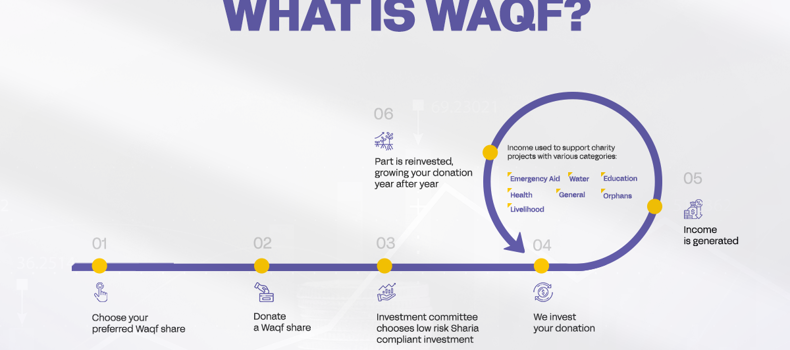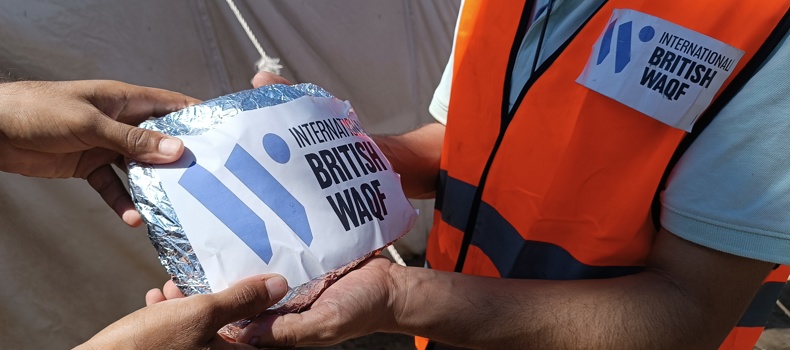Big changes ahead. Stay tuned!
Big changes ahead. Stay tuned!
Nothing here
Start typing to search
Searching..
Nothing matches
There are no matching results.
Sorry!
There has been an error.
Big changes ahead. Stay tuned!
Big changes ahead. Stay tuned!
Nothing here
Start typing to search
Searching..
Nothing matches
There are no matching results.
Sorry!
There has been an error.

what is the meaning of waqf
When Allah laid the foundations of Islam, He instituted various systems that serve as its pillars—economically, socially, legislatively, and in belief. Among these systems, waqf charity has long been one of the most vital elements of charitable work in Islam, playing a significant role in fostering social solidarity and achieving sustainable development. Waqf charity supports educational, health, social, and religious projects.
In this article, we will explore the meaning of waqf charity, its characteristics, its concept in Islam, the rulings regarding it, and its societal role.
What Does Waqf Mean?
Waqf charity is a Sunnah of the Prophet Muhammad (peace be upon him), referring to the act of dedicating a property or asset with the intention of benefiting others. This can involve donating the proceeds for charitable works that contribute to public welfare, such as building mosques, schools, hospitals, and caring for orphans.
One of the defining features of waqf is its permanence—the principal remains intact, and it is neither sold nor given away, while its returns are invested in serving the community. For this reason, scholars regard waqf charity as one of the greatest forms of continuous charity (Sadaqah Jariyah), where the rewards persist even after the benefactor’s passing, insha’Allah.
Characteristics of Waqf Charity
Waqf charity is a well-established concept worldwide, and it resonates even with other faiths. It possesses several defining characteristics that distinguish it from other forms of donation, including:
Durability and Sustainability: Waqf remains effective over long periods, as it is bound to its original purpose without alterations.
No one—including heirs or individuals—can use the waqf for personal benefit.
Professional Management: Waqf foundations are managed by specialised entities that ensure sustainability and optimal use of their returns.
Diverse Fields: Waqf can cover a range of areas, such as education, healthcare, poverty alleviation, and infrastructure development.

The Concept of Waqf in Islam
In Islam, waqf has become a legally recognised concept governed by Islamic law. It is both a prophetic tradition and a form of continuous charity. The legitimacy of waqf is supported by numerous Hadiths; the Prophet (peace be upon him) said, "When the son of Adam passes away, his deeds come to an end except for three: ongoing charity, beneficial knowledge, or a righteous child who prays for him." (Narrated by Muslim).
It has been recorded that Umar ibn al-Khattab (may Allah be pleased with him) established land for the service of Muslims. The story goes that he acquired land in Khaybar and approached the Prophet (peace be upon him), saying, "O Messenger of Allah, I have acquired wealth in Khaybar unlike any I have ever obtained. What should I do with it?" The Prophet replied, "If you wish, you can dedicate it and give its benefits in charity." Thus, Umar endowed it, stipulating that it could neither be sold, given away, nor inherited, with its proceeds allocated for the poor, relatives, captives, guests, and wayfarers.
Meanwhile, Uthman ibn Affan (may Allah be pleased with him) purchased the well of “Ruma” and dedicated it for the general public. Even today, this well remains a continuous charity.
Is it Permissible to Sell Waqf Charity?
Before addressing this question, it's important to clarify that waqf charity can encompass property, gold, money, vehicles, or any other assets that can be utilised beneficially.
In general, selling waqf is not permissible, as one of the essential conditions for a valid waqf is to preserve its principal from any change that could lead to loss. However, in certain instances, scholars permit selling or exchanging waqf if there is a compelling interest, such as being unable to benefit from it or needing to replace it with a more beneficial property.
The sale or replacement of waqf charity is permissible with the consent of a judge or the authorities responsible for managing waqfs, in situations including:
The Role of Waqf Charity in History and Society
For centuries, waqf charity has been an integral part of the development of Islamic societies, contributing to the establishment of magnificent buildings that continue to thrive today. Notable examples of contemporary waqf foundations include the esteemed Al-Azhar Mosque in Egypt and the historic University of Al Qarawiyyin in Morocco.
In the past, the famous traveller Ibn Battuta expressed his admiration for the waqfs in Damascus during the 8th century AH, under Mamluk rule. He noted that there were waqfs designated for those unable to perform Hajj, for the preparation of brides for marriage, for ransoming captives, and for wayfarers, who were provided with food and clothing.
The Ottomans also prioritised the establishment of waqf schools, universities, and public libraries, with their waqf charities still operational in modern-day Turkey. Interestingly, several prestigious universities in countries like Britain are considered waqf foundations, a practice that is well-recognised. However, the concept of waqf in Islamic countries extends beyond serving just Muslims; it is designed to cater to the needs of the entire community.
Today, waqf charity continues to play a vital role in achieving sustainable development through funding healthcare initiatives, supporting scientific research, and providing humanitarian aid in crisis-affected regions.
The Modern Form of Waqf Charity
Technological advancements and the evolution of economic systems have transformed the landscape of Islamic waqf, while still adhering to its fundamental principles.
At The International British Waqf, we manage waqf donations through financial shares committed to serving the community. We receive waqf donations from around the world and invest them in low-risk ventures, such as real estate. When these waqf foundations generate annual returns, we utilise these funds to finance charitable projects, while reinvesting a portion of the profits to ensure the principal remains intact, entering into a renewed investment cycle. In this way, it continues to operate as a form of ongoing charity (Sadaqah Jariyah).

In Conclusion
The objectives of waqf charity stand as a key means of social solidarity within Islam, guaranteeing the sustainability of giving and benefitting the community on a lasting basis. By contributing a waqf donation through The International British Waqf, you can support educational, health, and humanitarian initiatives, including water supply projects and care for orphans.
This method of giving elevates waqf charity to one of the finest investments for both this world and the Hereafter, ensuring its impact and reward as a continuous charity, by Allah's permission.
Frequently Asked Questions About Waqf
What is waqf charity?
Waqf charity refers to dedicating a property or asset, with its proceeds allocated to support charitable projects and public benefits such as education and healthcare.
What is the difference between charitable waqf and familial waqf?
Charitable waqf is directed towards public works that benefit the community, while familial waqf (also known as al-wakf dhurri) is aimed at sustaining the descendants of the waqif (the donor) and may transition to charitable waqf if beneficiaries are no longer available.
What are the main characteristics of waqf charity?
Waqf charity is characterised by its sustainability, the investment of proceeds into charitable initiatives, and the principal's inability to be sold or privately owned.
Is it permissible to sell waqf charity?
In principle, selling waqf charity is prohibited, except in exceptional cases where replacement is necessary to achieve a greater good, with the approval of the relevant authorities.
Why should I donate my waqf through The International British Waqf?
By donating your waqf through us, you ensure a secure investment compliant with Islamic law. Your contribution reaches the most needy communities globally, thanks to our collaboration with the organisation "Human Appeal."
Can I donate my zakat for waqf?
From a legal perspective, zakat is considered obligatory ("fard") and differs from waqf, which is a Sunnah. Thus, the methods and distributions of zakat vary from those of waqf charity. While zakat is a mandatory form of giving in Islam, waqf is voluntary.